Morons In Media Have Made NBA Rights Valuable Despite Minimal Interest In Product | Clay Travis
The NBA's current rights negotiation may be the most fascinating sports rights negotiation of all time.
Based on current reports, Amazon, Warner Brothers/Discovery (TNT's parent company), Disney/ESPN, and Comcast (NBC's parent company) are all battling for the NBA's rights package and willing to pay a substantial rights fee increase despite the fact that the NBA's audience has completely collapsed under the leadership of commissioner Adam Silver and the woke posturing of LeBron James, Gregg Popovich and Steve Kerr. A rational sports media universe wouldn't reward the lowest NBA ratings of any of our lives -- three of the last four NBA Finals are the lowest rated in the past 30 years -- with a rights fee increase at all. At least not one much different than an inflation related increase. (Thanks to Joe Biden's inflationary economy, the NBA would need to increase its rights fee by more than 50% simply to keep up with the pace of inflation since its last TV deal. But despite the disaster of the 2020 bubble season when Black Lives Matter was emblazoned on the court and players replaced the names on the back of their jerseys with (mostly) left wing political slogans, the NBA appears poised to notch increases in its rights fees based on the panic ensuing across every media company.
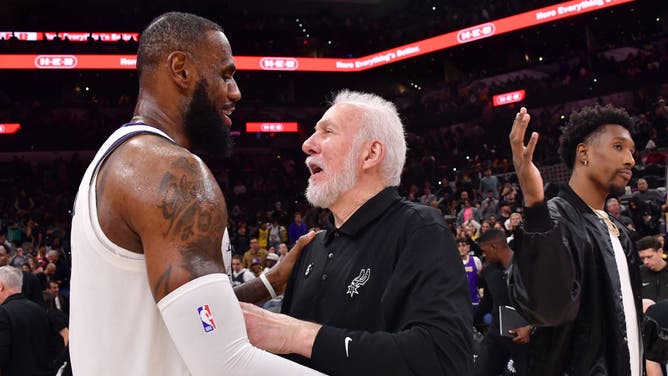
LeBron James and Gregg Popovich are two of the main reasons sports fans don't like the NBA. Nobody wants to be lectured. Despite the drop in ratings, the NBA is a valuable asset according to Clay Travis. (Photos by Michael Gonzales/NBAE via Getty Images)
Usually disastrous performances aren't rewarded. But these are not rational times. And an underdiscussed truth in business is this, you don't have to be perfect, you just have to be better than the people you're competing with. I mean, hell, I'm far from a genius and somehow OutKick has been kicking everyone else's ass in sports media growth over the past 5 years. When everyone else is behaving like morons, if you have an average IQ you look like a genius.
Which brings us to our present situation, there are a ton of desperate morons in media right now.
NBA rights negations aren't about product, they are about panic
And the NBA's rights package has arrived at a moment when the death -- or break up and fire sale of the respective parts -- of many big media companies isn't a crazy forecast. The demise of the traditional cable and satellite bundle -- something I've been writing about at Outkick for a decade, long enough ago that many people thought I was crazy when I started writing about it -- combined with the failure of any streaming company other than Netflix to make a profit so far, has led to utter panic in the media universe.
Many media companies argued that they would withstand the collapse of the cable and satellite bundle by moving their business to streaming. The idea was that as one ship sank, the cable and satellite bundle ship, executives would simply step to the new, sturdier and faster boat, the streaming industry. Only it hasn't worked out that way.
At all.
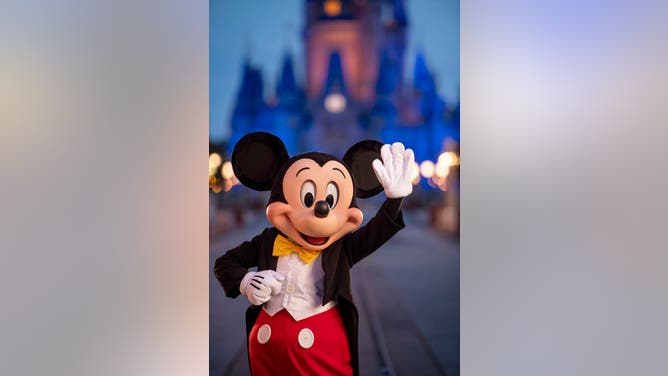
Disney and ESPN are a sinking ship and need the NBA to keep some assets. (Photo by Kent Phillips/Walt Disney World Resort via Getty Images)
Instead of stepping off the sinking boat on to the brand new boat, the advent of streaming -- and its massive losses, Disney has lost over $11 billion on Disney+ so far, for instance -- the media companies have actually hastened their own demise.
Instead of one slowly sinking boat -- the cable and satellite bundle -- there are now two sinking boats, the cable and satellite bundle and streaming -- which are both sinking faster than they would have if media executives had done nothing at all and just ridden out the slow decline of the cable and satellite industry. (The media company that has best seen this coming? Fox. Which managed to extract $71 billion from Disney for its entertainment assets rather than start a streaming service, and has been managing the slow decline of the cable and satellite bundle while continuing to increase earnings. Indeed, I should probably write an entire piece on this Fox decision. But that's for another time.)
Presently, Paramount is trying to sell itself and finding few suitors, Warner/Brothers Discovery just hit an all-time low stock price this week, Disney stock is the same price it was a decade ago, meaning with the impact of inflation if you just bought and held Disney stock a decade ago you have lost money even factoring in dividends, and Comcast hasn't really budged much in a decade either, meaning you've effectively lost money factoring in inflation there too.
Put simply, buying stock in traditional cable and satellite businesses has been an unmitigated disaster since cable and satellite subscriptions peaked back around 2014.
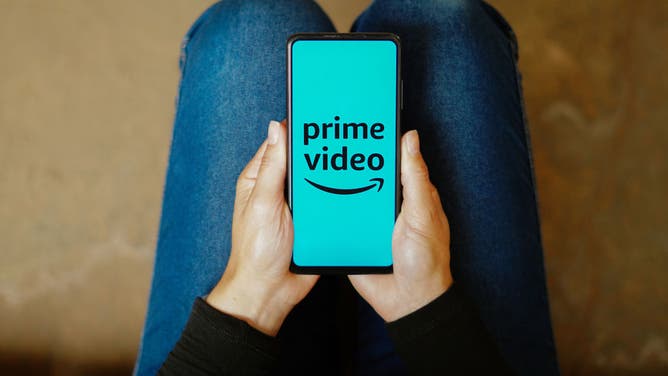
Amazon Prime Video will be airing Black Friday's Dolphins vs Jets game. (Photo Illustration by Rafael Henrique/SOPA Images/LightRocket via Getty Images)
Meanwhile big tech companies like Amazon and Apple, which have now moved into the sports content space, and Netflix, which has as well, have all surged to new stock highs over the past decade.
So what's really going on with the NBA rights package when you consider all the larger media realities? Why are four different companies all bidding for an NBA rights package that appears to only have three parts? And are any of the reported rights fee increases for the NBA remotely rational?
Well, let's dive in to the decision-making tree here and I'll try to make sense of all of this for you from the perspective of Warner Brothers/Discovery, hence WBD, Disney.ESPN, Comcast/NBC and Amazon.
First, let's start with Amazon, whom Bloomberg reported is poised to pay the NBA $1.8 billion per year for a brand-new streaming rights package.
As part of this deal Amazon would begin to stream NBA games, not unlike what it does with the NFL's Thursday Night Football package already.
On its face, this yearly payment of $1.8 billion is a substantial dollar investment, but given that Amazon presently has a market cap of nearly $2 trillion, it's actually a low stakes wager for Amazon.
And while I think the NBA audience won't be large, the moves that Amazon is making in sports at least make sense to me. Why? The Amazon sports investment thesis, which I haven't really seen laid out in a long-form piece, has to rely on advertising and sports gambling to a large degree. That is, given the number of Amazon Prime subscribers, presently 166 million in the United States alone, Amazon will know everything about all of us watching sports on its streaming platform.
Amazon would be investing in more than just NBA, think big-picture advertising
That is, they'll have our entire Amazon Prime ordering history to utilize and serve us all ads.
So instead of everyone watching a game on cable or network TV seeing the same ad, new parents will probably get way more diaper ads, and if you stream Jack Reacher, you'll probably get a ton of ads for the new Alan Ritchson movie, basically Amazon -- and Netflix and all other streamers -- are building an advertising nirvana, a holy grail of targeted ads that will be way more efficient for ad buyers and way more lucrative for ad sellers. If Amazon delivers on this strategy then the price it pays for sports will look small in the years ahead because the amount of advertising dollars it can unlock compared to what was paid for traditional cable and satellite ads will be gargantuan.
The era of specific ad sales promises to be an incredible business.
Plus, I still believe it's a no-brainer that Amazon is going to eventually buy a sports gambling company too.
Why?
To directly target you to gamble during games as well.
Remember, Amazon will know exactly where you're logged in, boom, you'll get ads direct for offers in your state. (It's also possible Amazon will just take everyone's money and not buy a sports gambling company, but sports gambling is really just an entry point to mobile gambling with casino games, which is happening in more states. It just feels inevitable to me that Amazon will buy a sports gambling company based on what they are spending on sports rights. This is also, by the way, why I think an even larger acquisition, especially if Donald Trump wins in six months and merger approvals get easier, is likely from Apple and Amazon in the sports space. Apple buying all of Disney, including ESPN, makes sense to me, and Amazon buying all of, say, Fox, except Fox News, could make sense too.)
So the Amazon strategy, while expensive, makes a ton of sense to me over the next decade or more because I buy the thesis that Amazon can unlock new value that hasn't been tapped by existing partners so far.
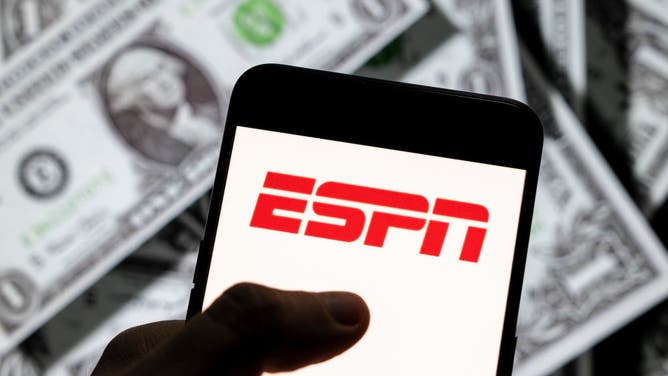
ESPN continues to raise prices and now, there is finally pushback. (Photo Illustration by Chukrut Budrul/SOPA Images/LightRocket via Getty Images).
ESPN looking to keep NBA out of desperation
Okay, what about ESPN?
ESPN, I continue to believe, is desperate and not in a good business position.
Remember the analogy I gave you above of the two ships sinking faster than either one of the ships would have sank by itself? That's what Disney is seeing with ESPN and ESPN+. ESPN+ is losing tons of money -- and not growing -- while ESPN's profits are rapidly collapsing as cordcutting accelerates.
At some point ESPN will offer everything to consumers directly, but I think that business will be a major challenge, far more challenging than the existing cable and satellite bundle.
Right now ESPN's reported increased cost for the NBA and for the expanded 12-team college football playoff will essentially erase its existing profit.
Based on reports, Adam Silver will require ESPN to pay $2.6 billion a year, over a billion dollars more than ESPN pays now, for a much worse slate of NBA games. That's highway robbery. The NBA's a declining audience business, but ESPN's a collapsing business, so ESPN is desperate and is overpaying as a result. That is, ESPN believes that not having the NBA will accelerate its business decline faster than paying way too much for the NBA will.
One caveat, I'm sure the excel spreadsheets the Disney execs are relying on to justify this bid are claiming that ESPN+ will be a huge success and the profits will eventually start flowing here to justify these exorbitant costs. I just don't buy that thesis. Why? ESPN's entire business has relied on people who don't watch sports paying a ton of money in subscription fees for cable and satellite packages. This analysis was a huge part of my 2018 book, "Republicans Buy Sneakers Too." Sports fans are going to have to pay way more now to get the same sports they used to get on cable and I continue to believe the sports streaming business is going to be very seasonal. That is, you might pay for football season, but most sports fans don't care about the NBA. Only a couple of million people watch. And if, as reported, the NBA Finals are going to be on ABC, people might just tune in there.
But, again, remember my two sinking ships analogy. ESPN, unlike Amazon, has dual revenue streams.
Disney/ESPN seems to be selling to the investment community the idea that they will be the one stop streaming shop for all sports fans in the future, but that logic only makes sense if someone like Apple buys them. Otherwise the money isn't there to make this happen. (Remember Disney has basically funded its disastrous streaming losses so far by making the theme park revenue explode. Essentially the cable and satellite business collapse has been covered up by charging way more for families to go to Disney World.)
I think this is yet another desperate bid for Disney/ESPN.
And I don't buy the thesis of their streaming offering at all. I think this NBA bid will just speed up the demise of ESPN.
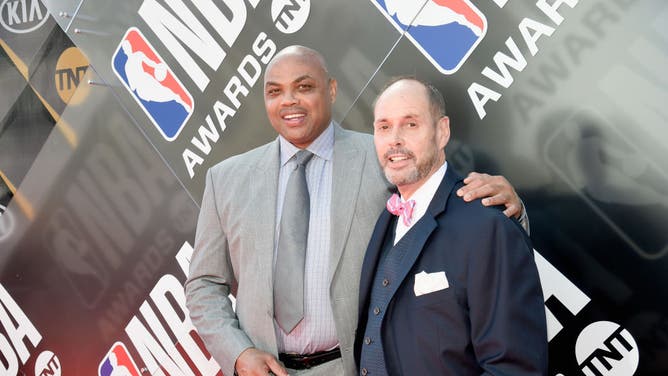
Charles Barkley and Ernie Johnson are a staple of TNT's coverage of the NBA. (Photo by Kevin Mazur/Getty Images for Turner Sports)
NBA rights could determine Warner Bros./Discovery future
But Amazon and Disney/ESPN aren't even the most interesting element to this battle, the final decision is by far the most interesting -- who gets the final piece of the rights puzzle, Warner Brothers/Discovery, the parent company of TNT, or Comcast, the parent company of NBC?
And this is where the NBA rights battle has turned into a potential battle for Warner Brothers/Discovery's survival. Reports are that Comcast has bid $2.5 billion to return the NBA to NBC and to put some of the games on Peacock as well. That's up from the $1.5 billion presently paid by TNT. There's also the report that Warner Brothers/Discovery has the potential to match any offer and retain the rights on TNT.
So what's going on here?
Comcast is making a super smart play that puts WBD in a brutal position -- they are damned if they walk and damned if they buy the NBA rights package at this price.
If TNT loses the NBA then Comcast refuses to pay big dollars for TNT in the future, cutting the rights fees and potentially costing WBD more than the NBA package would have cost them. (Comcast can make up some of the money it pays for the NBA by taking back what it gives TNT in the future). But if WBD buys the NBA to keep the games on TNT, the cash crunch from the declining value of its cable channels may put the company on the chopping block. Meaning Comcast could potentially drive up the cost to WBD so much that it ends up swooping in and buying the parts of the company it desires in the years ahead.
But that isn't all, you also need to add in that ESPN, Fox, and WBD announced a sports streaming service that is set to debut this fall. Well, what happens if WBD doesn't have the NBA any more? Do they still become a part of this streaming deal? Do they lose substantial equity in the process? (Comcast and Paramount were notably left out of this sports streaming partnership meaning that sports fans would only get about half of the sports events they want regardless. But that's with the existing rights included through TNT. Comcast, in taking away the NBA, would deliver a big hit to the ESPN, Fox, and WBD sports streaming service, potentially even forcing the deal to be scuttled.)
It's also a brilliant liar's poker play from Comcast. Even if they lose the NBA package, they've driven up the cost to Warner/Brothers Discovery where the company can't buy the rights and make any profit. As I noted, that might hasten WBD's path to the auction block, but it also eliminates bidders for other rights properties in the future. Remember, these competing companies would like to get the rights for themselves, but they also want to ensure everyone has to pay as much as possible because that limits the money they have to spend on the next rights package.
So the real story here is that the NBA rights are really just a small piece of the larger, potentially trillion dollar, battle playing out in the media universe.
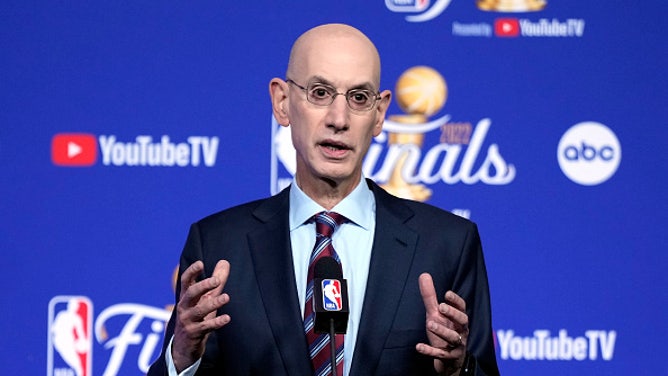
NBA commissioner Adam Silver. (Photo by Thearon W. Henderson/Getty Images)
Despite bad NBA product, this bidding war makes sense
What doesn't make sense on its surface -- the NBA increasing its rights fee despite awful ratings for much of the last decade -- actually does make sense beneath the surface.
Because it's really not very much about the NBA at all; it's about a relatively scarce number of live sports properties that can shift the balance of power in media businesses.
ESPN and TNT are both in dire straits, but the theory goes that both would be in even more dire straits if they don't have the NBA.
And the NBA waited long enough for a new streaming bidder, Amazon, to emerge. And Amazon appears willing to potentially lose a ton of money in the short term, but to eventually make money in the long term by investing in the NBA.
It's not that the NBA is a good value, it's going to be even more wildly overvalued under its new deal, but as anyone who has ever been out drinking knows, sometimes you don't have to be the hottest girl at the bar to have good options, you just have to be the last decent looking girl at the bar with a bunch of desperate dudes still hanging around with no other options.
And right now, the NBA is the soft six at closing time getting the attention a ten would.
Cha ching.